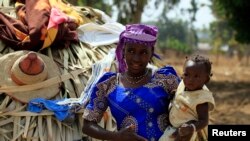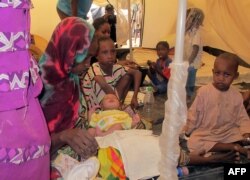African birth registration officials meeting in Cameroon say more than half of births in Africa are not registered, which can make it hard for children to enroll in school or access health care. Experts say legal reforms and education for parents and registration authorities are key.
The Yaounde central hospital reports an average of 180 births per month.
But the district's civil registrar, Dianna Monjuwa, said her office only processes about 60 birth certificates each month. Parents have three months to register their babies but many don't understand the process.
"For children born out of wedlock, the law states that the father's information should be left blank or the child is recognized, but most of the time they (mothers) will come with their grandfathers name saying the father did not show up. Most of the time people come here without their delivery certificates from the hospital. Most of the time they come after two years or three years when the child is about to go to school," said Monjuwa.
Cameroon's ministry of basic education reports at least 40 percent of children enrolling in primary school do not have birth certificates, which are required by law. That is on par with the situation throughout much of the continent.
African birth registration officials meeting in Yaounde say just 39 percent of newborns are registered at birth. The officials blame administrative delays and poor communication with parents in particular in rural communities.
Jean Luc Mastaki, economic affairs officer at the the United Nations Economic Commission for Africa says conflicts in places like Nigeria and CAR have also displaced millions of people making it difficult for them to register their babies and children. The laws are often not designed to accommodate displaced people.
"Within central and west Africa where we have a lot of demographic movement, we have to understand our population, who is who. It is about security to master who we are, how many are we. It is also related to human rights. Unless you have your civil registration act, you cannot have access to some protection related to human rights. It's all about identity," said Mastaki.
Mastaki said many Francophone African countries require certificates of delivery from hospitals but that ignores the reality that more than 40 percent of children in Africa are still born at home or in their communities.
Kaldaoussa Faissam from Cameroon's Ministry of Territorial Administration said they also need to better train civil status registration officers.
"We realize that we have a problem. The personnel in-charge are not well qualified, we realize that the population is not well sensitized about civil registration. The most serious thing is training. Most of them are recruited on the spot without any basic training concerning civil registration. If you go to the main civil status which is the city council, our mayors are not trained," said Faissam.
Countries like Senegal, Uganda and Tanzania have been using mobile technology to allow parents to report births by SMS, but experts say the impact of that technology is still limited by poor cell phone penetration in some rural areas. The number of African countries using mobile phone birth registration is expected to double from 15 to at least 30 countries by 2020.





